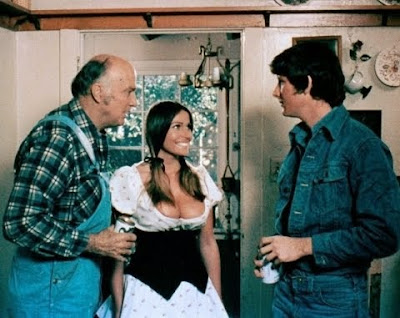Ride the High Country
Some of the finest Westerns examine the inevitability of getting older, of sticking around long enough to outlive your reflexes and also to gain an informed and mature perspective on living. Aging (anti-)heroes shake their heads at youthful cockiness. Maybe because they've been there themselves. Such protagonists have ridden every crag of the countryside, seen their share of corpses and haunted by the fact that those motionless forms were once compadres, family members. A great Western will also often allow the seasoned cowboy to offer guidance to the trigger-happy upstarts before the possible (inevitable?) tragedy.
Sam Peckinpah's 1962 RIDE THE HIGH COUNTRY incorporates all of the above, yet feels differently than other, oft-cited classics of the genre. Steve Judd (Joel McCrea) is a seen-it-all former lawman who feels the weight of his memories. He takes the occasional job, drifting around California in some unsavory places, fetching less compensation per day than he once did. Hired to guard the delivery of a shipment of gold through the high country of the Sierra Mountains, Judd recruits his former partner Gil Westrum (Randolph Scott). Life's been little better for him, as he is reduced to portraying a character called the Oregon Kid, a crack pistol shot who has a young sidekick named Heck (Ron Starr).
Judd and Gil trade stories of their glory days. They seem unfazed by the new assignment, despite that several miners have already perished attempting the haul. The pair has seen far worse, each experience adding another hard layer upon them. But while time and hardship fostered a solid morality into Judd, Gil is consumed with a sense of entitlement. He has a plan (with Heck) to perhaps double cross his friend and abscond with the gold.
Heck is an excitable kid, the kind who's prone to snap judgment and throwing a punch before acknowledging consequence. Judd takes an instant disslike to him. His efforts to impart wisdom are met with dissmisal. Was the old lawman ever this stubborn and impatient?
The journey has detours. A night spent at the farm of deeply pious Joshua Knudsen (R.G. Armstrong) is filled with dueling Bible verses across the dinner table and Heck's attempts to woo Knudsen's daughter Elsa (Mariette Hartley, in her debut). Problem is, Elsa is already engaged to Billy Hammond (James Drury). After an incident with her father, Elsa decides to leave and tag along with the trio, down to the mining camp where Billy works, to get married.
Billy is quickly revealed to be a real waste of a human being. After the wedding, he gets piss drunk and offers his bride to his four brothers, a lecherous gang (Peckinpah regular Warren Oates plays Henry). It is during this sequence that Heck gets some swift lessons in Life and begins to respect Judd. On what is perceived to be a legal technicality, the trio rescue Elsa and continue their ride. A posse follows.
This early Peckinpah effort has its share of violence, though far from the sort of orchestrated squib bursting seen in his later films. The action is not the draw. RIDE THE HIGH COUNTRY only uses its shoot-outs as reference to its main themes, perhaps a side effect of them. Themes continued in many films by the director: honor among men, "right" and "wrong", longsuffering, an overall moral code. Sometimes that code is singularly held by the main character, amongst a brotherhood of brutishness and greed. Men (not without sin themselves) who struggle with their beliefs in following justice as even those closest to them pay back with betrayal. Even as the entire West is eroded by technological advancement (remember the appearance of the automobile in THE WILD BUNCH?). Also refreshingly, women are given complexity.
McCrea and Scott embody their roles so completely, they become archetypes. Natural acting at its finest. The film itself is deeply moral, while quietly, artfully taking religious piety to task. RIDE THE HIGH COUNTRY is rarely mentioned in the same breath as SHANE, HIGH NOON, DESTRY RIDES AGAIN, THE MAN WHO SHOT LIBERTY VALENCE, or ONCE UPON A TIME IN THE WEST, but it does earn a spot in the Pantheon, or least a spot on your media shelf next to the aforementioned..



Comments